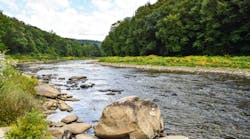Introduction
A 390-foot bridge and facility known today as the “Cross Border Xpress” connects California’s Otay Mesa to Mexico’s Tijuana International Airport. This transportation hub relieves the San Diego International Airport and both of San Diego’s conventional border crossings. The Cross Border Xpress offers typical airport amenities such as restaurants and duty-free retail, along with short and long-term parking.
Goals
Managing vehicle-born stormwater pollutants is a major concern for any high-density parking facility. Plastics and trash are often, intentionally or unintentionally, discarded in parking lots due to overflowing trash receptacles. Stormwater management of plastics pollution is a cost-effective practice for preventing these and other harmful pollutants from contaminating local waterbodies. Other pollutants of concern include sediment, nutrients, heavy metals, organic compounds, oils, grease, and bacteria.
The U.S. side of the project was initially designed and graded for an industrial-business park development which included subsurface infrastructure like storm drains and sewage utilities. The lines were installed before the site was acquired for the new airport crossing, but as a result of the existing obstacles, any new storm drain system would have to be designed around each location, increasing the engineering design challenges, and demand for versatile stormwater solutions.
Solution
Civil engineering firm Latitude 33 and Bio Clean’s design team selected assigned two Water Polishers, up-flow media filters known for ease of maintenance, and two Modular Wetlands, advanced stormwater biofiltration systems approved by the Washington State Department of Ecology.
As seen in Diagram 1, two Water Polishers were installed at each end of the site. The first unit was designed to treat 2.29 cfs and the second, 1.52 cfs from multiple catch basins throughout the site. The Bio Clean Water Polisher has been proven, through extensive testing, to be able to meet the treatment objectives required by the City of San Diego and therefore was approved for use on this project.
To meet additional stormwater quality requirements, the Modular Wetlands Linear biofilter was incorporated. The patented horizontal flow system is the only subsurface-flow wetland, providing intermittent and continuous flow treatment within a small footprint. The pretreatment chamber does the heavy lifting – collecting plastics, trash, debris, and sediment giving maintenance crews a focused and easily accessible location for collection and cleanings.
The Modular Wetlands is also extremely versatile and adaptable. The system can be successfully designed in a range of sizes without sacrificing performance. This proved to be a key feature for a site with existing utilities and various pre-existing storm drain depths (shallow & deep).
Conclusion
Together the Water Polishers and Modular Wetlands met each design challenge. Pretreatment in both solutions prevents plastics, trash, debris, and sediment from clogging the systems, and after years of operation, these systems have provided superior water quality, addressing some of stormwater’s most concerning pollutants.
Editor's Note: Scranton Gillette Communications and the SGC Water Group are not liable for the accuracy, efficacy and validity of the claims made in this piece. The views expressed in this content do not reflect the position of the editorial teams of Water & Wastes Digest, Water Quality Products and Storm Water Solutions.






